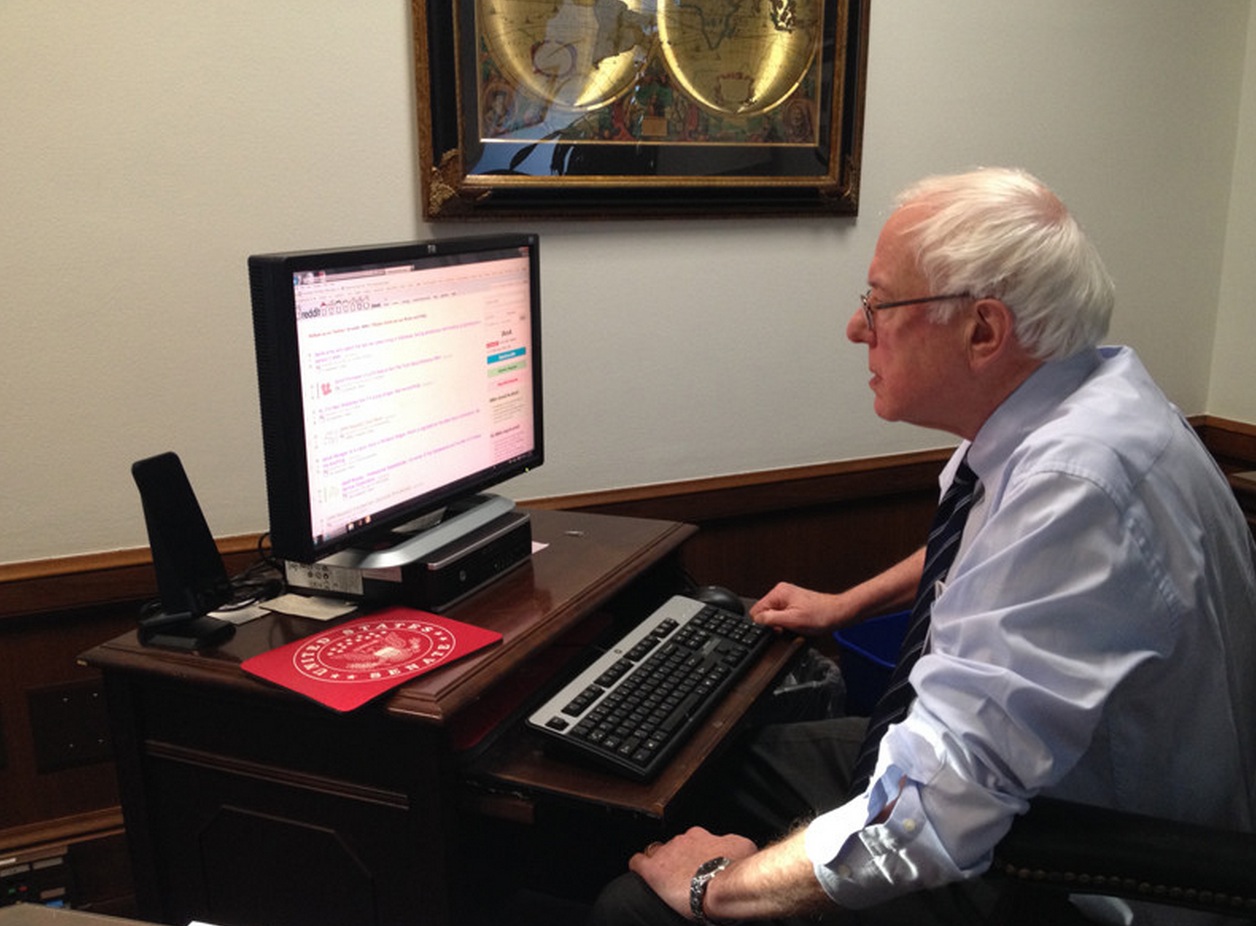[dropcap size=small]A[/dropcap]s an economics junkie, I find Bernie Sanders both entertaining and frustrating. He has been the center of two of my articles, both of which rustled the Sanders Circle. A good friend brought it to my attention that Sanders was doing a Reddit AMA to promote his presidential candidacy. Needless to say, I felt the need to address a few of his answers. The socialist has struck again!
In all fairness, we do agree on a couple of points: drug decriminalization and the Fourth Amendment. However, I did not come here for niceties.
When asked about trade agreements, Sanders quickly attributes the “decline of middle class” to the loss of factories and “good-paying manufacturing jobs”. As someone who works in manufacturing, I can tell you anecdotally and factually that United States manufacturing is better than it has ever been before. It has not declined, as Sanders believes, but rather dramatically changed and improved.
In 2009, the United States ranked higher than China in terms of manufacturing output. We actually lead the world in that regard. Furthermore, output has not stopped increasing since 1970. Sanders is correct that overall employment in manufacturing has declined, but that doesn’t tell the entire story. So what is really going on?
According to a report from the Federal Reserve of New York, manufacturing employment has only declined in the low and mid-level skilled jobs. This, however, has been met with a 36% increase in high skilled manufacturing jobs. Our manufacturing firms no longer produce low-cost trinkets, but rather high value goods. We even have foreign tech giants, such as ASML, relocating their manufacturing to the United States specifically for our cutting-edge labor force.
I addressed this topic in more detail in a post for We Are Capitalists. In short, the loss of manufacturing jobs has been offset by creation of new industries (i.e. software) as well as growth in other industries. The US economy has not experienced any net loss of employment as a result of free trade and automation, as Sanders implies. Our enhanced productivity has led to growth in other industries.
Sanders frequently answered questions with a return to the typical “decline of the middle class” narrative. By pulling Census data, we can see how this is misleading. The middle class looks much different today because they are a lot wealthier and have higher incomes. From 1990 through 2009, the percentage of people with lower and middle incomes has declined while more people are moving into the higher income brackets. As of 2009, 25% of the families earn $100K or more, which is up from 19% in 1990.
The middle class has “declined” to a higher standard of living and more wealth.
A recently published Harvard study concluded that mobility has not changed, nor has income inequality resulted in less mobility. According to the researchers, “percentile rank-based measures of intergenerational mobility have remained extremely stable for the 1971-1993 birth cohorts”. In other words, the rungs on the ladder have grown farther apart, but the chances of climbing it has not changed. Today, there are more millionaires in the United States than ever before.
In keeping with his socialist agenda, Sanders repeated the claim that we “demand the wealthy pay their fair share”. Rich people pay far more than their “fair share”. According to the CBO, the highest quintile of income earners pay almost 70% of income taxes. Instead of waging class warfare, how about we make everyone’s income tax the same? Zero. There are far more ways to fund the government than large income taxes.
As Milton Friedman said in his book Capitalism and Freedom, “An income tax intended to reduce inequality and promote the diffusion of wealth has fostered reinvestment of corporate earnings, thereby favoring the growth of large corporations…and discouraging the establishment of new enterprise”. In keeping with Friedman’s assertion, it is clear why self-employment and new enterprise growth have stagnated alongside progressive taxation and redistribution. Sanders wants to throw gas on the fire.
In many of his answers, the Senator continued back to his old talking points of raising the minimum wage. I disagree with that law on every level, but it makes even less sense at the federal level. Let’s say Sanders has his way and increases the federal minimum to $15. Well, that $15 is a lot different for someone living in San Jose, CA versus Lincoln, NE because of the cost of living. Such stark differences would mean that low-skilled workers in Lincoln are even more adversely affected by a higher minimum wage.
I have written about the minimum wage before and found it is not a convincing way to alleviate poverty. Every minimum wage increase has been an income redistribution amongst low skilled workers. Essentially, previously non-poor workers slightly above the poverty line are equally likely to fall into poverty just as much as poor workers will get out of poverty.
There’s not always an immediate effect on employment, but a higher minimum wage does lead to lost income growth. NBER researchers concluded that, in the years following a minimum wage hike, workers at or slightly above the old minimum wage experience negative outcomes in long-term income growth. In fact, even modest increases cause employers to use different adjustment mechanisms that reduce income growth, but do not immediately hurt employment.
As a fervent socialist, Sanders wants to make everything “free”. During the AMA, he said that everyone is “entitled to a college education”. He makes the usual points of student loan debt and asserts that people carry student debt from $60K to $100K.
Sanders is basically saying that high price colleges cost lots of money, therefore all colleges are unaffordable. According to College Board, the average cost of tuition and fees for a four-year private school was $31,231, or about the price of a nice new car. In-state residents spend about $9,000 for a public university. Hardly what I would call “unaffordable”.
If Sanders is concerned about the number of people with student debt, perhaps he should look at the practices of the federal government. The feds hold far more in student loans than any private lender. As federal loan programs increased, so has there been the largest increases in tuition. In fact, the Brooking Institute found that most of college education is already financed by aid.
In other words, a major portion of college tuition is already “free”. Net tuition has only increased 13%, but, if you include grants, gross tuition has sky rocketed. The market is now a competition for government funding instead of student demand. With plenty of government money to go around, schools increasingly spend money on non-educational activities to boost enrollment. As a result, only 28% of spending goes to instructional use for public universities. The rest goes to fund research, expensive temporary teachers, and paying people not to teach.
The United States is the premiere country for college education with nearly every top 20 school in the world. Countries where education is “free” fall well short of that title. Making college free will increase access, but at the cost of diminished quality.
I don’t think Bernie Sanders is sinister, but rather completely misguided. While we align on many civil issues, his economic platform is hardly applicable to the United States. His AMA showed that he does have a sincerity that lacks in the political sphere, but that does not make up for his poorly conceived economics.
Our economy suffers from too much government involvement and central planning. We do not need more protectionist laws that stifle innovation and new enterprise.




